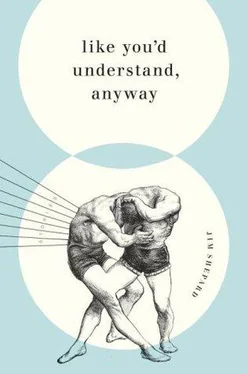I told him I did. Especially the MacArthur Park one.
He seemed happy about that. “You can play them when you get back,” he said.
“You all right?” the Camp Director asked me. He'd come out of his inner office, where he had Chris. He looked at my neck. He didn't leave until I nodded.
I was holding the dial part of the phone in front of me. I'd lifted it off the desk but there wasn't much reach on the cord. “You there?” my brother said.
“Yeah,” I said. “You gonna be okay?”
He started crying. “They're gonna put me somewhere,” he said. “I'm scared.”
“Oh, Georgie,” I said.
And what I could have said then was: I'll come home and we'll talk and you'll feel like somebody understands and you won't have to hit yourself or throw everything you have around the room. Or you can come up and see me, come up and visit, come up and be a part of the worst camp anybody's ever seen. Or let's keep our records together. Let's keep them in your room. Let's make a list of all the ones we've got. Or I'm sorry I make it harder and I have trouble too and maybe if we take walks or get a hobby we can figure out how to get through this. Or put Daddy on, you can't go away, you have to stay, we have to stay together. But what I did was the kind of thing you'd do and the kind of thing you've done: I felt bad for him and for myself and I went on with my week and then with my summer and I started telling my story to whoever would listen. And my story was: I survived camp. I survived my brother. I survived my own bad feelings. Love me for being so sad about it. Love me for knowing what I did. Love me for being in the lifeboat after everyone else went under. And my story made me feel better and it made me feel worse. And it worked.
My father, Jean-Baptiste Sanson, had christened in the church of Saint-Laurent two children: a daughter, who married Pierre Héris-son, executioner of Melun, and a son, myself. After my mother's death he remarried, his second wife from a family of executioners in the province of Touraine. Together they produced twelve children, eight of whom survived, six of whom were boys. All six eventually registered in the public rolls as executioners, my half brothers beginning their careers by assisting their father and then myself in the city of Paris.
My name is Charles-Henri Sanson, known to many throughout this city as the Keystone of the Revolution, and known to the rabble as Sans Farine, in reference to my use of emptied bran sacks to hold the severed heads. I was named for Charles Sanson, former adventurer and soldier of the King and until 1668 executioner of Cherbourg and Caudebec-en-Caux. My father claimed he was descended from Sanson de Longval and that our family coat of arms derived from either the First or Second Crusade. Its escutcheon represents another play on our name: a cracked bell and the motto San son: without sound.
You want to know — all France wants to know — what takes place in the executioner's mind: the figure who before the Revolution wielded the double-bladed axe and double-handed sword and who branded, burned, and broke on the wheel all who came before him. The figure who now slides heads through what they call the Republican Window on the guillotine. Does he eat? Does he sleep? Do his smiles freeze the blood? Is he kind to those he kills? Does he touch his wife on days he works? Does he reach for you with blood-rimmed fingernails? Did he spring full-blown from a black pit to send batch after batch through the guillotine?
Becoming shrill, my wife calls it, whenever I get too agitated in my own defense.
“What struck people's minds above all else,” Livy, the great Roman, wrote in his History on Brutus's sacrifice of his own sons for the good of the Republic, “is that his function as consul imposed on the father the task of punishing his sons, and that his unbendingness compelled him personally to order the execution, the very sight of which was not spared him.” In Guérin's rendering of the scene, the hero turns away but does not blanch. Standing before it in the old Royal Academy with Anne-Marie, I told her that perhaps this is the way we attain the sublime: by our fierce devotion to the required. She was not able to agree.
I am a good Catholic. The people's judges hand out their sentences, and mine is the task of insuring that their words become incarnate. I am the instrument, and it is justice that strikes. I feel the same remorse as anyone required to be present at an execution.
Before the Revolution, justice was apportioned and discharged in the name of the King, who ruled by divine right as one of God's implements. Punishment of malefactors was God's will and therefore earned for his sovereign minister God's grace and esteem. But in the eyes of most, that grace and esteem did not extend as far as the sovereign's handservant. Before the Revolution, daughters of executioners were forbidden to marry outside the profession. When their girls came of age, such families had to display on their doors a yellow affidavit clarifying the family's trade, and acknowledging the taint in their bloodline. Letters of commission and payments were not passed into their hands but dropped before them. They were required to live at the southern ends of towns, and their houses had to be painted red.
Before the Revolution, a woman with whom I dined at an inn demanded I be made to appear in court to apologize for having shared with her a dinner table. She petitioned that executioners be directed to wear a particular badge or color upon their coats or singlets so that all would know their profession. Before the Revolution, our children were allowed no playmates but one another.
For lunch today there was egg soup with lemon juice and broth, cock's comb, a marrowbone, chicken fried in bread crumbs, jelly, apricots, bread, and fennel comfits. Clearing the table, Anne-Marie reminisced about a holiday we took when the children were small. When she speaks to me, she holds the family before us like a pleasing little stove. At first she was able to treat this terrible time as a brigand unable to trespass upon the better world she bore within.
With children, everything and nothing registers. My earliest memory is of the house outside Paris, and the height of the manure pile, and the muck dropped by the household geese. I remember flies whenever one went outside. I remember my mother's calm voice and associate it with needlework. She was fond of saying that I had no ideas of grandeur and that she would wish that to continue. My grandmother always chided me for losing even a crumb of my bread, since, as she put it, I couldn't make for myself even that. My father was a quiet man who, when it came to my understanding the world, resolved that his little boy should become a person capable of self-sufficiency, so he allowed me to negotiate my own passage through that household. I was perceived to be headstrong but inhibited. I was sent away at an early age and then pitched from school to school, since the moment my classmates uncovered my family's profession, life became unbearable again. I wrote my mother a series of supplications outlining my misery and pleading for a response. In a cheerless chapel in a school in Rouen — my fourth in as many years — I received my father's letter informing me of her death.
He remarried; the house was repopulated with half brothers and sisters; I stayed away at my schools. I matured into a beanstalk whose expressions excited pity on the street. My teachers knew me as dutiful, alert, frugal, and friendless: a nonentity with ambitions. I was often cold and known for my petitions to sit nearer the room's hearth. I volunteered for small errands so that in solitude I might gather the strength to face the rest of the day. I wrote to myself in my notebooks that I felt my bleak present within me and ached to my bones with wondering if loneliness would always be the measure of my days.
Читать дальше












